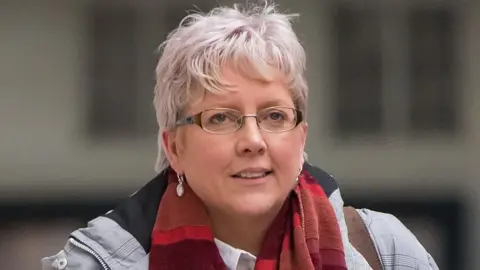Carrie Gracie row: Equality watchdog EHRC to write to BBC
 PA
PAThe UK's equality watchdog is to write to the BBC following the resignation of its former China editor Carrie Gracie amid claims of pay inequality.
The Equality and Human Rights Commission said it would consider whether further action is required based on the corporation's response.
Ms Gracie, who has alleged "unlawful pay discrimination", thanked the EHRC for "demanding facts on BBC pay".
The BBC said "fairness in pay" was "vital" to the corporation.
In a statement, the EHRC said: "Women have a legal right to equal pay with men for equal work."
The watchdog said it was aware of Ms Gracie's claims and would write to the BBC, "requiring them to provide us with information on their pay policy and the facts in this individual case".
It added: "We will consider whether further action is required based on this information."
It said a new requirement for thousands of firms to report on gender pay gaps would "do more to end discrimination" in the workplace.
Ms Gracie, who is returning to her former post in the TV newsroom in London, has worked at the BBC for 30 years and led its China coverage since 2014.
She said she resigned as China editor because she could not "collude" in a policy of "unlawful pay discrimination" after discovering an "enormous gap" between her £135,000-a-year salary and that of her male counterparts.
Her actions attracted praise on social media from BBC colleagues, MPs and members of the public.
In a tweet, Ms Gracie thanked the EHRC for its intervention and the "BBC audience for trusting me that this fight is for principle not money, for all staff not 'stars'".
Allow X content?
In a pay disclosure last year, North America editor Jon Sopel was listed as having a salary of between £200,000 and £249,999, while Middle East editor Jeremy Bowen earned between £150,000 and £199,999.
"When I started the China job, I said I will only do this job if I am paid equally," Ms Gracie told BBC News on Monday.
"And in July 2017 I discovered the enormous gap that the two men - who were international editors - were earning 50% more at least than the two women who were international editors".
She said she had refused a £45,000 rise as it still left a "big gap" between her and her male counterparts when all she wanted was to be "made equal".
In an open letter, Ms Gracie said the issue was about "men earning more in the same jobs or jobs of equal value. It is pay discrimination and it is illegal".


The BBC has conducted a judge-led audit of the pay of most of its staff, which showed no systemic discrimination, and has commissioned accountancy firm PWC to carry out a separate review of on-air staff, which will be published "shortly".
A BBC spokesman said: "The BBC was one of the first to publish a gender pay report showing we are significantly better than the national average."
Speaking on BBC Two's Newsnight, employment lawyer Jennifer Millins, who represents several women taking cases against the corporation, said Ms Gracie's case may "give some answers" to other complainants.
Up to 200 women at various levels of the BBC have made complaints about pay, according to BBC Women, a group of about 150 broadcasters and producers.
Sian Kevill, the former director of BBC World News, said she was "quite shocked" at the pay disparity between international editors.
"When you have the same job title, it does seem to denote that you have roughly the same salary," she told Newsnight.
But she added that pay could be "very tricky" if someone is hired externally, but has higher pay because they work in a competitive field or have worked in warzones, for example.
